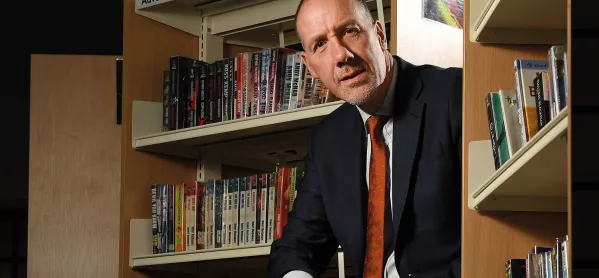- Home
- ‘There IS reason to hope amid the gloom in education’
‘There IS reason to hope amid the gloom in education’

In Michelle Obama’s new memoir, Becoming, she describes the moment that her bookish, ever-late and endlessly untidy new husband, Barack, tells her he’s thinking of becoming a politician.
“Most of what I knew about politics came from what I read in the newspapers and none of it seemed especially good or productive,” she writes. “In my heart, I just believed that there are better ways for a good person to have an impact.”
But Barack Obama, of course, saw things differently, saying to the cynical, mistrustful crowds of would-be voters he encountered: “Do we settle for the world as it is, or do we work for the world as it should be?”
Even then - long before he had presidential ambitions - he exuded the audacity of hope.
So here, at the end of a long and exhausting term, with an education system still dominated by funding cuts, a deepening teacher-recruitment crisis and sullied by unethical issues such as off-rolling, can we reach out in the gloom for some audacious hope?
Because, as the Chinese proverb tells us, it is better to light a candle than to curse the darkness. And I suspect we’re all craving some optimism.
Over the past year, I’ve met hundreds of school and college leaders, lots of teachers and pupils, and spoken on and off the record to dozens of politicians and their officials, and here’s what I see: chiefly, I see good people working hard to make things better.
Politicians are easily dismissed as self-serving careerists, their officials as faceless paper-pushing bureaucrats. But I don’t see that. And I detect a growing consensus that when it comes to our education system, we can’t simply keep on doing what we’ve been doing. Too much joy is being squeezed out of too many classrooms, and too many good people are turning their backs on the profession and walking away.
I sense a change of mood.
‘We realise we’ve flogged accountability to death’
For a start, the official response to the funding crisis has become less robotically dismissive. We saw that at the weekend with the education secretary’s announcement of an additional £350 million to support children with special educational needs. It isn’t enough money, of course, but it is a welcome recognition of the reality in the run-up to next year’s spending review.
It’s the same with accountability. Ofsted’s determination to recalibrate inspection, and help schools and colleges to reclaim deeper curriculum leadership, shows a commitment to improving education in a genuine, long-term way rather than through gimmicky quick fixes.
I also sense from the officials I meet that the current, oppressive accountability regime - the labyrinthine and ever-changing measures used to quantify schools - have run their course. Indeed, a government adviser said to me last week: “We now realise that we’ve flogged accountability to death. It can no longer drive improvement.”
I sense an appetite for a fledgling idea that the Association of School and College Leaders’ policy team is developing. We refer to it as “inclusive accountability”. Our starting point is this: what would it look like if schools and colleges were judged on what they did for the children on the margins, and how they ensured that those with the fewest opportunities had access to the same ones as the privileged?
No one I’ve spoken to about inclusive accountability has said anything other than “can we be part of it?” It may just be a sign that the age of crushing, debilitating accountability, with its perverse incentives, is coming to an end.
Understated optimism
Throughout the year I’ve met school and college leaders who exemplify what Muhammad Ali said about public life: “Service to others is the rent you pay for your room here on Earth.”
In schools and colleges, I meet great public servants. Yes, I still see far too many who are weary and anxious, worried for their pupils, their staff and their own futures. But they also know that communities look to them, quietly appreciating someone who works hard to give their city, town or village the kind of educational institution it deserves at a time when so many other public services have withered away.
As always, these leaders step up to play their part, publicly confident, even when privately panic-stricken. And this happens across the system in all types of school and college.
In other words, this year I’ve seen people who won’t settle for the world as it is, but who quietly and determinedly, and usually without much recognition, are working for the world as it should be. They exemplify an understated optimism that in the current political climate means a lot. They show leadership. And for all of that, they deserve our heartfelt thanks.
Happy Christmas.
Geoff Barton is general secretary of the Association of School and College Leaders
Keep reading for just £1 per month
You've reached your limit of free articles this month. Subscribe for £1 per month for three months and get:
- Unlimited access to all Tes magazine content
- Exclusive subscriber-only stories
- Award-winning email newsletters



